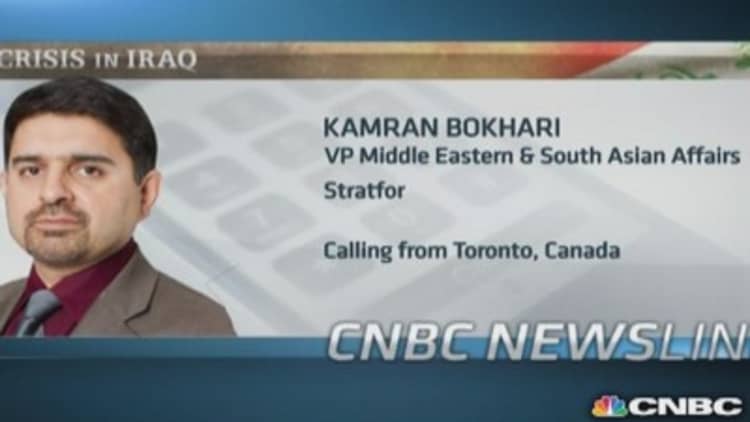
As the spotlight turns to what action the U.S. will take to quell growing violence in Iraq, there is talk about whether any steps will involve collaboration with Iran.
According to media reports Shiite Iran is so alarmed by the progress made by Sunni insurgents in Iraq that it may be willing to cooperate with Washington to return stability to its neighbor.
Islamist militants have taken control of large parts of Iraq including Mosul, the country's second biggest city, over the past week, stoking fears of renewed instability in the oil-rich Middle East.
Read MoreAdvancing Iraq rebels seize Northwest town in heavy battle
""[Direct talks between Iran and the U.S.] are something we have predicted at Stratfor for some time. It is necessary because ultimately, American, Iranian, Turkish and Kurdish interests coincide – and that is to prevent jihadists to have a free rein over territory in Syria and Iraq," said Kamran Bokhari, vice president of Middle Eastern and South Asian Affairs at Stratfor, a geopolitical intelligence firm.
"This is not the first time that Iran and U.S. would have collaborated against jihadists. There was massive collaboration just after 9-11. So if they collaborated when they were enemies, imagine what could happen when we're on path to rapprochement on the nuclear issue," he added.
Read MoreIran deploys forces to fight rebels: WSJ
Iran has been aggrieved for some time by what it sees as U.S. efforts to sideline it in the Middle East. Relations between the countries, however, have improved recently especially on the contentious nuclear issue.
"The U.S. and Iran both have an interest in stability [in Iraq]," Kevin Logan, chief U.S. economist at HSBC told CNBC. "Both countries want the region stable and to keep the oil flowing so if they have that unity of interest perhaps they'll find a way to co-operate."
Still, some experts warned against closer U.S.-Iran ties to restore stability to Iraq.
"I don't think that co-operating with Iran is in the best interests of Iraq, the United States or the region," former U.S. ambassador to Bahrain Adam Ereli told CNBC Asia's "Squawk Box" on Monday.
Bobby Ghosh, international editor for TIME magazine and a former bureau chief in Baghdad, told CNBC late last week: "Iranian soldiers fighting in Iraq, no matter who they're fighting against, have a potential to destabilize what is already a pretty chaotic situation."
Last week, U.S. President Barack Obama said Washington was not ruling out air strikes to help the Iraqi government fight insurgents. Air strikes by the U.S. would be the first armed intervention in Iraq since the end of the U.S.-led war.
Read MoreIraq slows rebel advance, US sends carrier to Gulf
"Iraq is a patient about to expire and if we don't exercise some very intensive care the patient will die," said Ereli, vice chairman and public strategy firm at Mercury, in Washington.
"So the first thing is to stop the advance of ISIS and give them [the Iraqi government] some breathing room to address the underlying problems," he added, referring to the rebel forces that made advances in Iraq. "There's a lot we can do short of sending troops back– air strikes is one option, military supplies to Iraqis and logistical support is important."
Stratfor's Bokhari said that even if the U.S. and Iran collaborate, this may not be enough to stop the rise of insurgent forces in Iraq.
"I think U.S.-Iranian alignment is necessary but not sufficient," he said. "There is the other side – the Sunni Arabs. So at some point the U.S. would have to bring in Saudi Arabia to not inflame sectarian violence."


